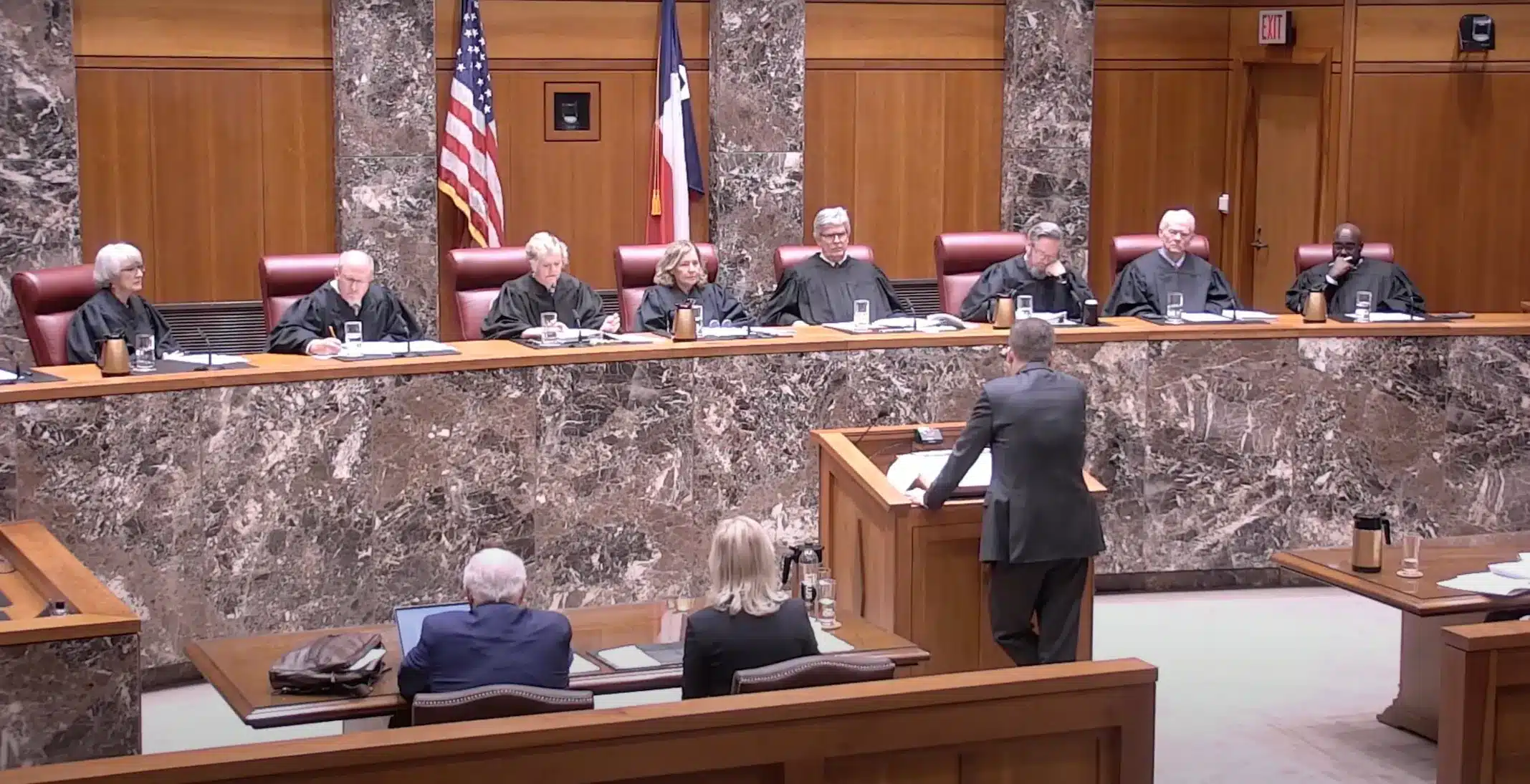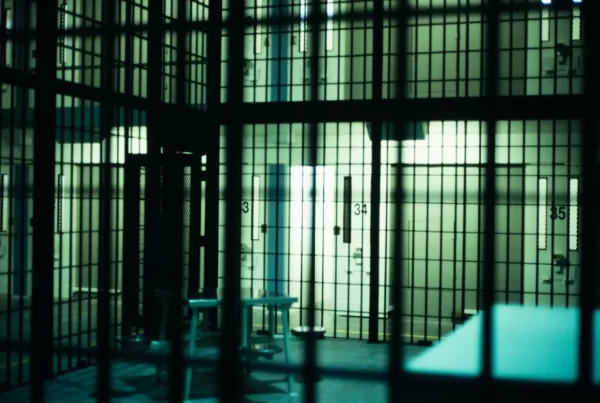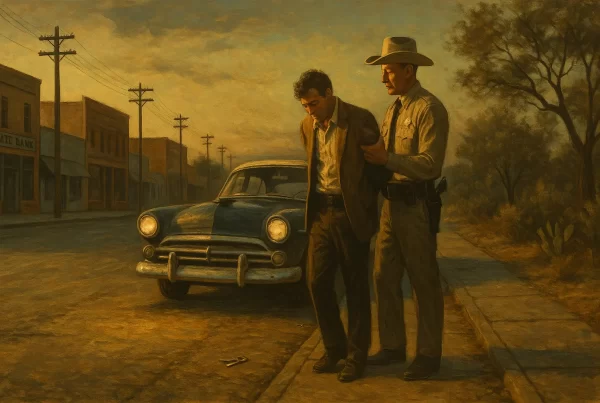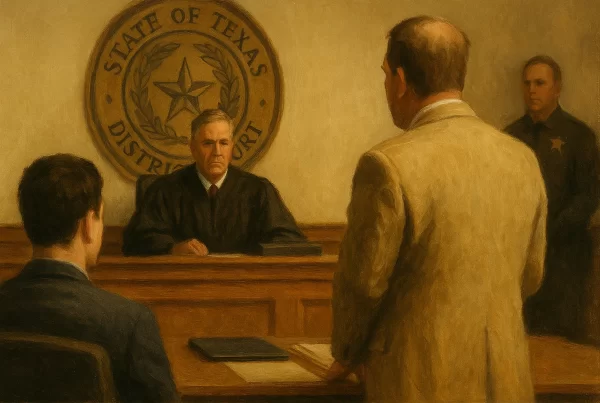The Texas Court of Criminal Appeals is the highest appeals court for criminal matters in the State of Texas. Alongside the Texas Supreme Court, which handles civil matters, it is the highest court in the Texas judiciary.
Texas is one of only two states in the United States that have twin high courts of roughly equal standing, a system that arose from unique historical circumstances.
The Texas Court of Criminal Appeals consists of nine judges, including one presiding judge who is chosen for the role by the others. Formally, the members of the court are called “judges,” not “justices,” in contrast to the Texas Supreme Court and top courts elsewhere.
Role of the Court
The Texas Court of Criminal Appeals (TCCA) is the highest appellate court in the state for criminal cases. As the final authority on criminal law in the state, the court reviews a wide range of cases, including those involving convictions, sentences, and procedural issues in criminal trials. Its decisions set legal precedents that shape criminal law and procedure in Texas, influencing how lower courts handle similar cases in the future.
The TCCA reviews cases brought before the court, which include appeals from both state district courts and lower appellate courts. While the TCCA does not hear trials or reexamine facts in the case, it examines the legal principles involved, such as whether there were errors in the trial process or constitutional violations that might have impacted the outcome.
For background, an appeal is a legal process where a higher court reviews a lower court’s decision to check for errors in law or procedure. In Texas, individuals convicted of a crime have the right to appeal their verdict or sentence, ensuring fairness in the justice system. While not all cases are granted an appeal, this process allows for the review of potential legal or constitutional errors that may have affected the trial’s outcome. The right to appeal helps protect against wrongful convictions and ensures consistent application of the law.
In Texas, criminal appeals typically go first to one of 15 regional Courts of Appeals located throughout the state. (However, in death penalty cases, the appeal is automatically directed to the TCCA). If a party is dissatisfied with the decision made by a regional appellate court, they can then petition the Texas Court of Criminal Appeals. The TCCA has the discretion to accept or reject cases from the regional courts and typically focuses on cases with significant legal questions or constitutional issues.
Each year, the Texas Court of Criminal Appeals agrees to review only a small fraction of the thousands of cases submitted to it. For instance, in 2016, the court reviewed 100 cases out of 4,458 appeals. Thus, while most appeals start in a regional appellate court, the TCCA serves as the final arbiter in criminal matters in Texas.
Election of Judges
The judges of the Texas Court of Criminal Appeals are elected in statewide elections and serve six-year terms. Like other judicial elections in Texas, these elections are partisan, meaning that they can involve party primary elections in the Spring, before the general election in November.
The terms of the judges are staggered, with three judges of the court up for reelection every two years. This system ensures that the composition of the court evolves gradually over time, rather than undergoing a complete change all at once.
Current Judges of the Court
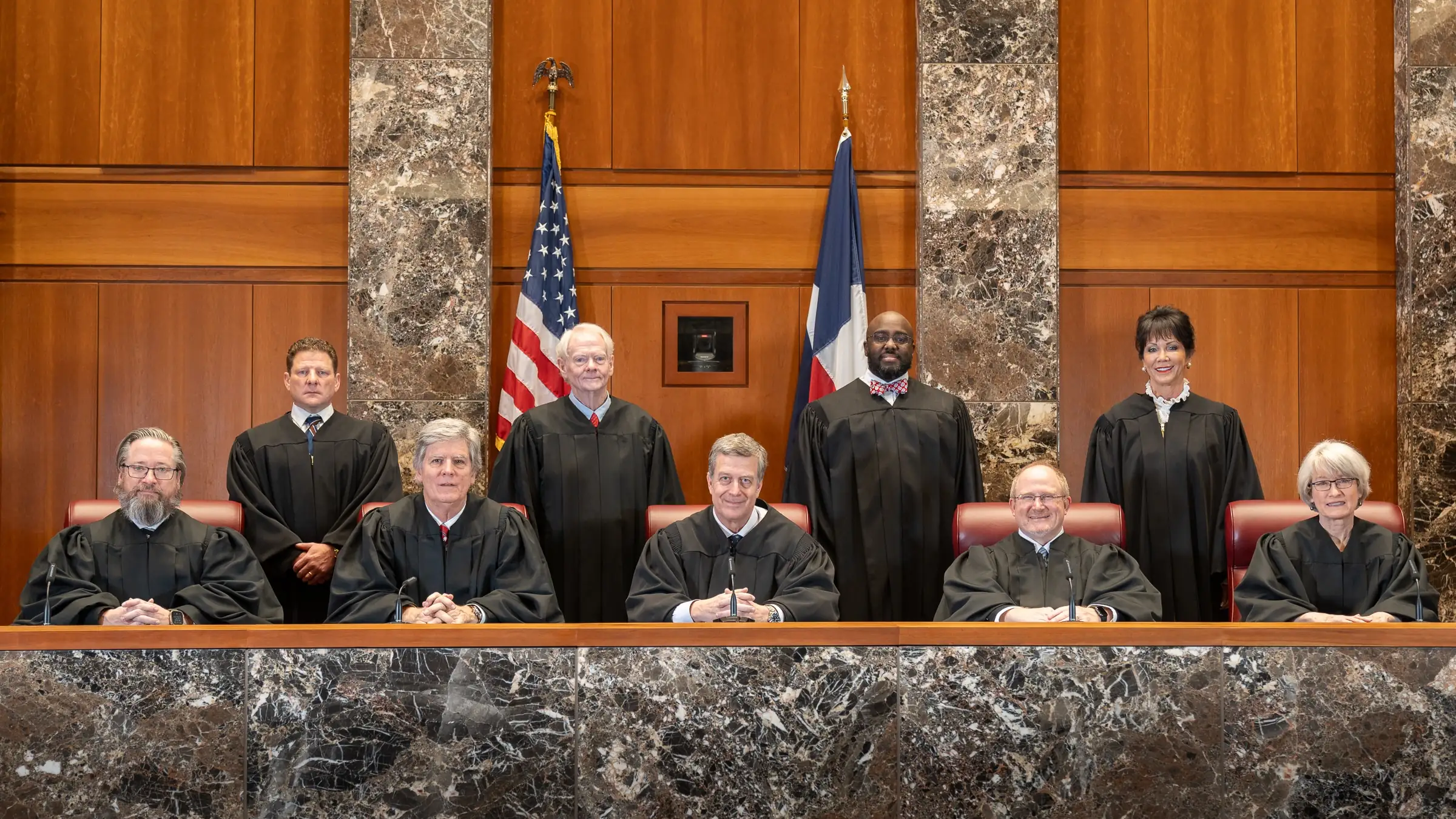
The table below lists the current judges of the Texas Court of Criminal Appeals.
| Office | Name | Party | Date Assumed Office |
|---|---|---|---|
| Place 2 | Mary Lou Keel | Republican | Jan 1, 2017 |
| Place 3 | Bert Richardson | Republican | Jan 1, 2015 |
| Place 4 | Kevin Patrick Yeary | Republican | Jan 1, 2015 |
| Place 5 | Scott Walker | Republican | Jan 1, 2017 |
| Place 6 | Jesse McClure | Republican | Jan 1, 2021 |
| Place 7 | Gina Parker | Republican | Jan 1, 2025 |
| Place 8 | Lee Finley | Republican | Jan 1, 2025 |
| Place 9 | David Newell | Republican | Jan 1, 2015 |
| Presiding Judge | David Schenck | Republican | Jan 1, 2025 |
Qualifications of Judges
Judges of the Texas Court of Criminal Appeals must be between the ages of 35 and 75, citizens of the United States and Texas, and licensed to practice law in Texas. They must also have practiced law as a lawyer or judge for at least 10 years.
Vacancies on the court are filled by appointment of the governor for the remainder of the unexpired term until the next election. Such appointments are subject to senate confirmation.
Types of Cases Heard
These are examples of the types of cases commonly decided by the Texas Court of Criminal Appeals:
- Appeals from criminal convictions: The Court reviews appeals from lower courts in felony cases.
- Post-conviction writs of habeas corpus: The Court examines requests to challenge the legality of a conviction after it has become final, typically raising constitutional issues or new evidence.
- Death penalty cases: The Court automatically reviews all death penalty cases to ensure due process has been followed and to confirm the sentence is just.
- Motions to stay execution: In death penalty cases, the Court may hear motions to delay an execution pending further legal review.
- Certiorari petitions: The Court may grant review of cases when a party petitions for it, typically when there is an important legal issue or conflict in the law.
- Appeals in criminal law issues of statewide importance: The Court can take on cases that involve significant or unresolved questions of criminal law.
Court Staff
The Texas Court of Criminal Appeals employs about 70 people, including the judges. Each judge is assisted by a permanent attorney and a law clerk, who is typically a young lawyer recently graduated from law school, as well as an executive assistant.
Additionally, the court as a whole is served by three staff divisions: Central Staff, Clerk’s Office, and Judicial Education. The largest division, Central Staff, consists of about 20 employees in three sections: General Council, Writs, and PDR (Petitions for Discretionary Review), which screen applications for appeal from the lower courts.
The court’s Judicial Education section oversees Fund 540, the Judicial Court and Personnel Training Fund. The fund provides grants for the continuing education of judges of all levels, court personnel, prosecuting attorneys, and public defenders. Specialized training topics funded through this program have included mental health, innocence, and forensics.
Organization Chart
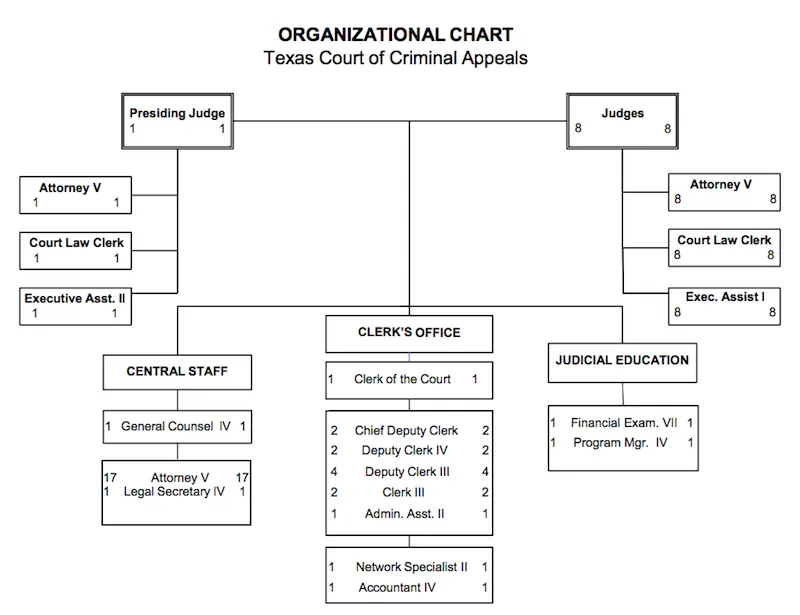
Courtroom and Offices
The Texas Court of Criminal Appeals shares a building with the Texas Supreme Court, located near the Texas Capitol at 201 West 14th Street, Austin, Texas.
